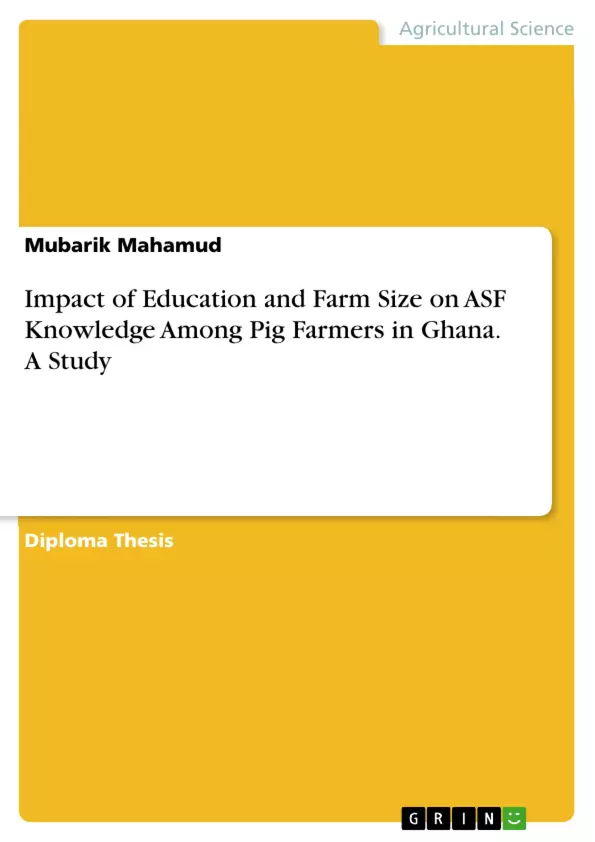The aim of this study is to assess the awareness and knowledge of African Swine Fever (ASF) among pig farmers in the Jirapa municipality of the Upper East region of Ghana. Given the high virulence of the disease and the absence of vaccines, it is crucial to enhance knowledge about prevention measures to minimize economic losses in the pig industry.
African Swine Fever (ASF) poses a significant threat to the pig industry, especially due to high mortality rates and stringent control measures such as culling and movement bans. This study investigates the knowledge of ASF among pig farmers in Ghana, selecting 106 respondents through a multi-stage sampling method.
Inhaltsverzeichnis (Table of Contents)
- Chapter one
- Introduction
- Background to the study
- PROBLEM STATEMENT
- Justification of the study
- RESEARCH OBJECTIVES
- MAIN OBJECTIVE
- SPECIFIC OBJECTIVE
- RESEARCH QUESTIONS
- Main research question
- Specific research questions
- Significance of the study
- Scope of the study
- Limitations and delimitations of the study
- Organisation of the thesis
- Chapter two
- Literature review
- Introduction
- Conceptual framework
- History of African Swine Fever in West-Africa
- Epidemiology
- Transmission
- Clinical signs in susceptible hosts
- Control options
- African swine fever vaccines
- Chapter three
- Methodology
- Empirical review
Zielsetzung und Themenschwerpunkte (Objectives and Key Themes)
This project work investigates the knowledge levels of pig farmers in Jirapa municipality, Upper East Region of Ghana, regarding African Swine Fever (ASF). It aims to identify the prevalence of knowledge about ASF amongst these farmers, analyze the factors influencing knowledge levels, and propose strategies for enhancing awareness and preventing ASF outbreaks.
- Knowledge level of pig farmers on ASF
- Factors influencing ASF knowledge levels
- Importance of education and awareness campaigns
- Impact of ASF on the pig industry
- Strategies for ASF control and prevention
Zusammenfassung der Kapitel (Chapter Summaries)
Chapter one provides an introduction to the study, outlining the background, problem statement, justification, research objectives, research questions, significance, scope, limitations, and organization of the thesis. Chapter two presents a comprehensive literature review, exploring the conceptual framework, history of ASF in West Africa, epidemiology, transmission, clinical signs in susceptible hosts, control options, and existing vaccines. Chapter three details the methodology used for data collection and analysis.
Schlüsselwörter (Keywords)
African Swine Fever, pig farmers, knowledge level, ASF awareness, control measures, epidemiology, transmission, Ghana, Jirapa municipality, swine industry, biosecurity, education, awareness campaigns.
- Citar trabajo
- Mubarik Mahamud (Autor), 2023, Impact of Education and Farm Size on ASF Knowledge Among Pig Farmers in Ghana. A Study, Múnich, GRIN Verlag, https://www.grin.com/document/1436726



